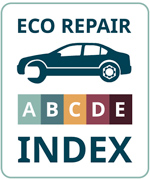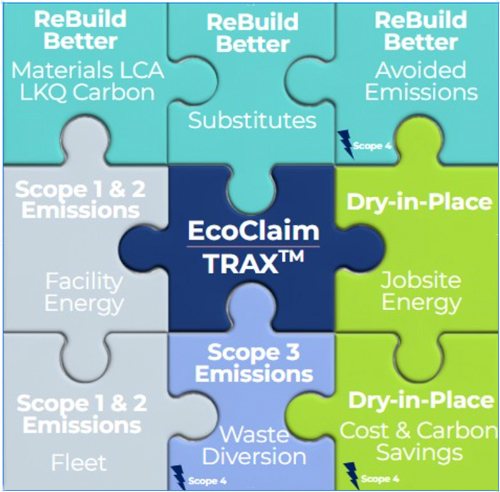The circular economy is one of the major solutions to our ongoing and accelerating climate and nature crisis. Why? Because materials stay in the economic circle as long as possible - so circularity turns waste into a resource, eases overextraction of natural resources and reduces carbon emissions drastically. Costs will also go down the more markets for recycled parts are growing. Ideally, product design already incorporates the reusability and recyclability of various materials.
When insurers enter the cycle through claims, they have a big lever to advance circularity in measuring carbon emissions and acting on emissions reductions.
Think of recycled front bumpers for a vehicle repair instead of a new part or repairing the windshield instead of installing a brand new one. In a property claim, building back to a more climate resilient solution and usage of low-carbon building materials will increase community resilience and decrease carbon emissions.
Innovation for the insurance industry
At the Guidewire Vanguards Pitch Day in London on 26 June 2025 two out of the five finalists for insurance innovation were related to sustainability in claims. This shows the relevance of the topic for the insurance market. Both solutions complementary cover major non-life lines of business - motor and property insurance lines (including commercial lines) make up approximately 70-80% of the total global P&C insurance premiums. Eco Repair Score focuses on vehicle claims repair carbon emissions and EcoClaim calculates the carbon footprint of property claims.

With the Insurtech Vanguards program, Guidewire, a partner of the global P&C insurance industry, drives innovation in the industry and aims to showcase new solutions to their customers and the broader insurance market. The program was launched by Guidewire's Chief Evangelist Laura Drabik over 3 years ago and has since seen a significant increase of climate and sustainability related insurtech value props. Faura, the winner of last year's competition held at ITC in Las Vegas offers solutions for climate resilience.
For insurtechs and new players the annual Vanguards Pitch Day is a unique opportunity to present their products to a highly interested and engaged audience of relevant players in the P&C insurance market.
Guidewire offers P&C insurers a cloud platform for the whole insurance lifecycle including data & analytics and a comprehensive ecosystem of third-party solutions - the Guidewire Marketplace - with apps and innovative content for the industry. The Vanguards program is part of Guidewire's Marketplace ecosystem.
EU regulations support the circular economy
As 50% of total greenhouse gas emissions and more than 90% of biodiversity loss and water stress come from resource extraction and processing, the EU launched a new Circular Economy Action Plan in 2024 - a concerted strategy for a climate-neutral, resource-efficient and competitive economy under the European Green Deal. Scaling up the circular economy will make a decisive contribution to achieving climate neutrality by 2050 and decoupling economic growth from resource use, while ensuring the long-term competitiveness of the EU.
In order to promote the free repair choice, the EU has also published the so-called Repair Clause in 2024. It provides vehicle manufacturers full protection over the design of their new cars, but it also ensures that this protection is not extended to the corresponding visible spare parts (such as car body panels, headlamps and windscreens). This means that these parts may freely be produced, distributed and used for repair purposes in the aftermarket.
With this legislation, the EU helped to drive new approaches for circularity in automotive repair and claims management.
Vehicle claims - repairing is key
Kévin Le Blévennec, Circular Economy Strategist and LCA Expert pitched the Eco Repair Score solution. Eco Repair Score® was founded in Belgium and works for companies across Europe. Through seamless API integration and automated Life Cycle Assessment, Eco Repair Score provides accurate, data-driven insights to help insurers, fleets, and repair networks track emissions and optimize repair strategies. Vehicle identification and repair operations are automatically matched with their database to ensure accurate impact measurement. An automated Life Cycle Assessment (LCA) is generated, quantifying CO2 emissions and other environmental indicators with precision.

With scaling insights from single repairs to entire claim portfolios, Eco Repair Score enables insurers to track emissions, benchmark performance, and define sustainability strategies.

The environmental impact measurement SaaS solution can be directly integrated with existing systems and is fully GDPR-compliant to protect customer privacy and company data. Kevin pointed out that “a positive correlation was observed between the reduction in repair costs and the use of more sustainable repair techniques. For every 1 % improvement in the relative Eco Repair Score©, the cost per repair fell by 17,99 €”.
Property claims - a solvable puzzle
Construction creates an estimated 1/3 of the world’s waste and at least 40% of the world’s carbon dioxide emissions. About 45% of total insurance emissions come from direct operations and claims. Property claims are heavy in construction and demolition activity and consequently heavy in emissions.

EcoClaim, a Canadian company has launched EcoClaim TRAXTM - the worlds first carbon intelligence software to track the Scope 3 and Scope 4 emissions related to the carbon footprint of a claim. EcoClaim provides insurance companies with accurate, field-level data, creating a pathway to move beyond traditional benchmark estimates. This precise data enables better planning and more effective decision-making, leading to tangible actions that drive real emissions reductions throughout the insurance claims supply chain.
Jodi Scarlett, co-founder of EcoClaim and presenter of the solution at the Pitch day made clear that “by becoming EcoClaim certified, firms in the supply chain commit to sustainable practices over time - they are introduced to key concepts and moved forward towards sustainability one “puzzle piece” at a time.”

This approach makes a lot of sense as most companies are still at the early stages of their claims carbon footprint and could easily be overwhelmed by all the data that is measured and analyzed.
Comply and lead on sustainability
Moving forward with sustainability in claims offers various opportunities for insurers. They reduce their carbon footprint and contribute to a low-carbon economy.
According to McKinsey, the claims function accounts for 85 % of operational insurance emissions, which gives insurers a big lever to comply with regulatory requirements to lower emissions and costs in their supply chain.
Last but not least, claims are a tangible, real-world opportunity to engage with clients on sustainability, and build and retain the customer relationship. Insurers can demonstrate green credentials and lead in the transition to a low-carbon economy.